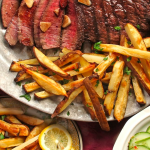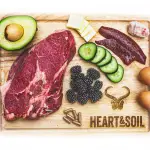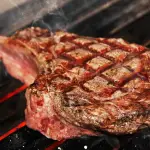There is a mismatch between the modern food system — which has been around for only 100 years — and our ancestral physiology, which was forged over millions of years of evolution. Both the keto and carnivore diets aim to correct this mismatch.
The carnivore diet is an elimination diet, while keto is a diet that reduces your carb intake to keep you in a state of ketosis.
The carnivore diet is best for people looking to treat illnesses like autoimmune conditions, while keto is best for people who want to stay away from highly processed carbs, lose weight, and adopt a healthier lifestyle.
TABLE OF CONTENTS
Keto Diet vs Carnivore: Similarities & Differences

Both the keto and carnivore diets focus on eating nutrient-dense, fatty foods like our ancestors ate, and eliminating high-carb, high-processed industrial foods that are harmful to us.
Here is a full breakdown of the similarities and differences:
Similarities
Helps with Weight Loss
Insulin is the fat storage of your body. When you don’t eat highly-processed carbs, your pancreas doesn’t produce additional insulin. Therefore, whether you are on a keto or carnivore diet, your insulin levels will be reduced and you will lose weight quickly.
People who have followed the keto diet have significantly reduced their body weight and their BMI. Moreover, their blood sugar along with LDL cholesterol and triglycerides decreased.
Reduced Carbohydrate Intake
Even though the carb intake on both diets varies, both the carnivore and keto diets reduce your total carb intake. On a standard American diet, 45 to 65% of your calories come from carbs.
The carnivore diet aims for a 0% carb intake, while the daily consumption of carbs on a keto diet is limited to 5 to 10%, which still is a significantly low amount. It’s this low carb intake that triggers and sustains the state of ketosis, or burning fat for fuel instead of carbs.
Differences
Protein Intake
On a ketogenic diet, the protein intake is moderate and most of the calories come from fats. However, on a carnivore diet, your protein intake is very high along with a moderate level of fat.
Vegetables
When you are on a keto diet, you can have greens like broccoli, Brussel sprouts, asparagus, and avocados with your meals. But when you are following a carnivore diet, you are not allowed to have any vegetables at all because they contain anti-nutrients that can irritate your gut.
This is also the main difference in carnivore vs paleo.
Cheat Days
On a ketogenic diet, the goal is to maintain ketosis. It’s possible to increase carbs one day a week (or “cycle” them) and still slip straight back into ketosis if your body is fat adapted. The diet can be relatively flexible.
However, a cheat day is not a good idea on the carnivore diet because the diet only works if you consistently eliminate the foods that cause you issues.
About the Carnivore Diet
On a carnivore diet, you eat only meat, organ meats, and animal-based products. You can’t eat plant-based foods like fruits, grains, and vegetables. It is basically a low-carb, high-protein elimination diet. Because it’s so strict, there are both pros and cons to the carnivore diet.
How to Follow Carnivore Diet
Most carnivores follow a nose-to-tail approach — you eat anything that comes from an animal. Many people start with just meat and salt, and gradually introduce other animal foods like eggs, raw dairy, and pure honey if they can tolerate them. Typical carnivore diet macros vary per person.
Foods to Eat
- Meat — including duck, turkey, chicken, beef, lamb, goat, and pork
- Dairy products
- Seafood
- Eggs
- Honey
Foods to Avoid
The foods that you can’t eat on carnivore diet are:
- Grains
- Legumes
- Nuts
- Seeds
- Vegetables
- Fruits
- Seed oils
- Vegetable oils
Benefits of the Carnivore Diet
There are several benefits of following a carnivore diet. It eliminates plant toxins and harmful anti-nutrients, which are linked to allergies, inflammation, vitamin deficiencies, fertility issues, and bowel issues.
This diet also helps you lose weight. The calories that you consume from protein and fat take a longer time to break down, which reduces your cravings as you remain full for a longer period of time. It also improves your gut health and reduces inflammation.
There are many carnivore diet testimonials about the benefits of eating only animal products from people who stuck with it for a long period of time.
About the Keto Diet
The ketogenic diet focuses on cutting down the number of carbs you consume. It doesn’t matter whether you eat meat or greens. All you need to do is to keep your carbs to a level where ketosis can be maintained in your body.
Moreover, on keto, you get most of your daily calories from fat. You have to limit your protein intake as well since it can take you out of ketosis. You limit your protein and carb intake, but can have any other food you want as long as it doesn’t disturb ketosis.
The keto diet limits your carb intake to almost 20g per day. Keto sets down the macro percentages that you can consume in a day rather than defining the specific foods that you can eat.
The macros are:
- 0 to 10% calories from carbs
- 15 to 30% calories from protein
- 70 to 80% calories from fat
How to Follow Keto Diet
On a keto diet, you can eat fatty cuts of steak along with high fats such as fatty fish, cheese, and seafood. You can also consume non-animal foods such as low-carb fruits and vegetables.
Foods to Eat
- Fish
- Shellfish
- Meat
- Poultry
- Eggs
- Dairy
- Cheese
- Vegetables
- Nuts and Seeds
- Fats and oils
Foods to Avoid
- Bread
- Pasta
- Rice
- Beer
- Honey
- Syrups
- Condiments
- Dry fruits
- Potatoes
- Beans
Benefits of the Keto Diet
The ketogenic diet is highly beneficial for weight loss as well as for controlling your blood sugar. Evidence from different studies shows that this high-fat, low-carb diet helps in treating cancer, Alzheimer’s, and other health conditions.
The Keto diet is also linked with improved blood pressure.
Conclusion: Which Diet is Best for You?
Let’s recap:
- Keto — a more flexible diet that allows you to eat most foods except things high in carbs and sugar. If you want to lose weight or reset your metabolism to burning fat for fuel, the keto diet is an excellent choice to live more in tune with our ancestors and how are bodies are meant to function.
- Carnivore — an even stricter version of keto where you elinate all but the most essential nutrient-dense foods (i.e., animal products) on order to heal your body. It’s best if you suffer from autoimmune conditions or have issues with your gut.
We suggest doing the carnivore diet as a complete bodily reset. Once your body has healed, you can come off the carnivore diet, and start reintroducing other foods.
Some people prefer to focus on animal products, but burn carbs for energy instead, opting to do a carnivore diet with fruit. Others reintrduce vegetables but stay low carb, and follow a keto diet.
Our recommendation is to experiment and see what works best for you. Ideally, you should eat local, seasonal produce, and build a true and personalized ancestral diet based on whether your body prefers burning carbs or fat.









Leave a Reply